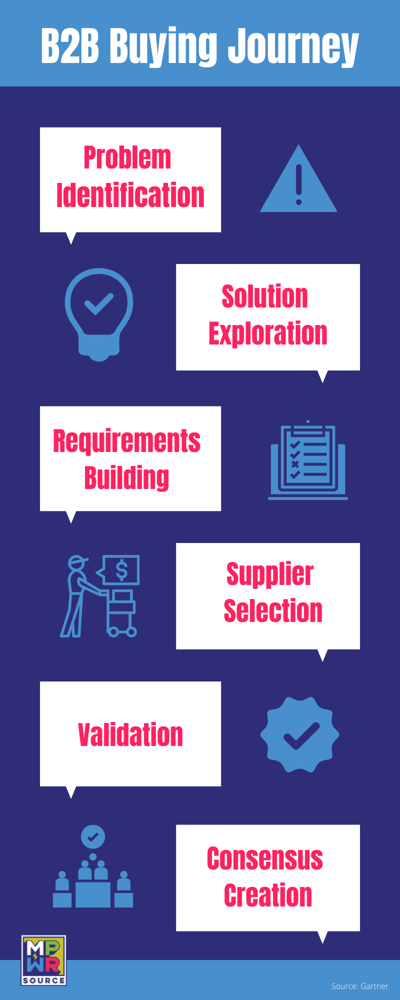Sales, as defined by the father of modern-day marketing principles, Philip Kotler, is a component that lies within the overall marketing strategy, where selling means providing the customer with the good or service he or she needs in exchange for a price. (Fun fact - The origin of selling and buying began in 7th century BCE in the area known today as Turkey, where people used gold and silver coinage in retail trade.)
In our upcoming blog series, we are focusing on B2B sales.
What is B2B sales?
B2B (business to business) sales generally refer to companies who primarily sell products and services to other businesses, rather than directly to consumers. B2B companies generally offer raw materials, finished parts, services, or consultations that other businesses need to operate, grow, and profit.
 Examples of B2B sales includes:
Examples of B2B sales includes:
- An accounting firm that provides accounting services to businesses.
- A payroll and financial services company providing paychecks for businesses’ employees.
- A merchant services company providing payment methods for businesses.
- An IT company providing managed services and security for businesses.
- A growth agency providing growth strategies, consultations, and services to businesses to help drive revenue and ROI for businesses.
- A company who manufactures tires and sells them directly to car manufacturers.
Sellers in the B2B space are businesses focused on bringing value to other businesses because buyers in the B2B space seek a return on investment. This market requires a unique approach. The B2B sales approach requires significant planning, as well as understanding their client’s or customer’s business processes and goals. It requires nurturing trust between the seller and buyer, which in the B2B realm is two organizations. B2B sales requires not only new business development or the acquisition of new clients, but B2B sales requires account management to nurture the relationships with clients, as well as lead the clients toward success.
In general, B2B sales are complex and have a longer sales cycle than sales to a direct consumer. The sales cycle in B2B sales takes weeks, requires many discussions, and often times, encompasses multiple transactions. Additionally, B2B sales usually have a higher price point than selling directly to consumers. B2B sales requires interacting with multiple stakeholders and decision makers. According to Gartner, a typical buying group for a complex B2B solution involves 6-10 decision makers, and according to CSO Insights, three-quarters (74.6%) of B2B sales take at least 4 months to close, while nearly half (46.4%) take 7 months or more to close.

Gartner has identified six B2B buying “jobs”, or steps, that customers must complete to their satisfaction to successfully finalize a purchase.
Steps of a Customer
on their B2B Buying Journey:
- Problem Identification – “We need to do something.”
- Solution Exploration – “What solution can solve our problem?”
- Requirements Building – “What do we need the purchase to do for us?”
- Supplier Selection – “Does the solution actually do what we want it to do?”
- Validation – “We think we know the right answer, but we need to be sure.”
- Consensus Creation – “We need to get everyone on board.”
The six B2B buying jobs may not occur linearly. For example, a client may begin to research a CRM tool, but while researching, they may discover that the problem they perceived to have while researching the CRM tool was not their actual problem.
The B2B salesperson should act as an advisor or a coach to help the client understand the true problem, so that a real solution can be applied. In this way, a B2B salesperson is much like a General Practitioner or Family Doctor. A B2B salesperson must evaluate the entire body of the business and all of the vitals, like revenue, contribution margin, efficiency, turnover, etc. After conducting a full diagnostic, the root pain points can then be determined, and then, the right specialists or solutions can be brought in.
With the complexity involved in B2B sales, B2B salespeople need to have a constant pipeline of deals to be working. Additionally, B2B salespeople need to be willing to work with a team and to collaborate. B2B salespeople may still be required to source their own deals, but they also need to work with marketing teams. Marketing teams are working on generating sales qualified leads, and through collaboration, more sales can be won.
While data and technology are changing the business landscape, there is one element that remains integral to sales, human and interpersonal relationships, and, as Brian Tracy, a Canadian-American motivational public speaker and self-development author says, “Approach each customer with the idea of helping him or her solve a problem or achieve a goal, not of selling a product or service.”